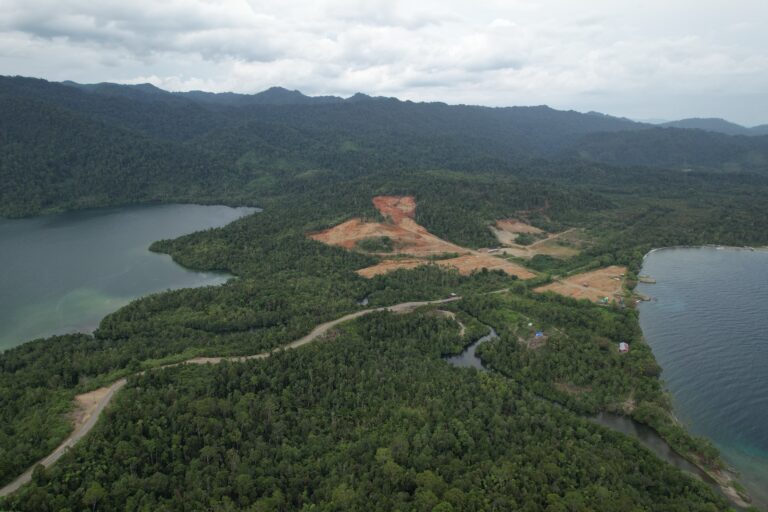(Jakarta) The Indonesian government should act on the recommendation of North Maluku provincial environment authorities and suspend the nickel mining operations of five mining companies to ensure freshwater supplies are safe, Climate Rights International said today. The companies should pause their operations until they clean up current levels of pollution and implement measures to prevent future unsafe discharges into rivers and groundwater.
On September 4, the North Maluku Provincial Environmental Agency issued a letter to PT Weda Bay Nickel, PT Halmahera Sukses Mineral, PT Tekindo Energi, PT First Pacific Mining, and PT Karunia Sagea Mineral recommending that they temporarily halt mining activities in Central Halmahera Regency. The provincial authority issued a recommendation instead of an order because under Indonesian law the provincial environment agency does not have the power to order companies to halt operations, even in cases of serious risk to human health. Only national authorities have these powers.
“While nickel is a critical mineral for electric vehicle batteries and key to the fight against climate change, mining must be done in a way that does not harm the health of local communities and does the least damage possible to the environment,” said Brad Adams, Executive Director at Climate Rights International. “For communities dependent on rivers and underground aquifers, toxic pollution of their drinking water is disastrous. The national government should order a halt to mining until these unsafe practices are halted and plans are put in place to prevent a recurrence.”
Local residents told Climate Rights International that the Sagea River turned dark brown, indicating that the water is mixed with soil sedimentation from upstream areas where mining occurs. Villagers in the area rely on the river and a network of aquifers, underground rivers, and caves that provide clean water to residents.
Save Sagea, a local community-based organization, complained to the North Maluku Province Environmental Service, which on September 4 wrote a letter to the five companies recommending that they “temporarily stop all mining activities in order to prevent further negative impacts from spreading on the Sagea River until the results of an investigation and evaluation of the alleged case.”
Under Indonesian law, companies must ensure that water quality meets certain thresholds for pH, temperature, total dissolved solids, and hexavalent chromium. Law No.32 2009 stipulates that companies must provide accurate and transparent information about their environmental management, including water pollution monitoring. Article 98 of the law states that companies that fail to comply face three to ten years of prison and are subject to IDR3 billion to IDR10 billion in fines (US$196,000 to US$656,000).
However, Indonesian environmental organizations say that enforcement is weak and the national government often prioritizes industrial development over environmental protection.
Indonesia is the world’s largest producer of nickel, supplying 48.8 percent of the world’s nickel in 2022. Approximately 30 percent of Indonesia’s nickel comes from North Maluku. Indonesia’s nickel deposits are located near the surface of the earth and are extracted through open pit mining, a type of strip mining where layers of topsoil, overburden, and ore are removed. Open pit mining poses serious threats to the local environment, including water and air pollution, permanent habitat loss, and increased risk of erosion and landslides. Many of these impacts can be avoided if companies implement strong environmental standards, including proper management of mining waste and tailings, treating wastewater before discharge, monitoring downstream water quality, and making that data publicly available and readily accessible.
While Indonesia had taken steps to decentralize power and increase regional autonomy in the post-Suharto era, the 2020 Job Creation Law, popularly known as the Omnibus Law, and the Energy and Mineral Law have re-centralized regulatory authority to Jakarta as the Joko Widodo administration has prioritized industrial development over protection of health, clean water, and preservation of forests.
Civil society groups and activists argue that these policies have given extractive industries a green light to override local concerns and stripped powers from regional governments to regulate and monitor the mining sector.
Law reform is critical to ensure that local environment regulators, who are closest to the situation and understand local concerns, are able to act to protect human health, Climate Rights International said. Powers should be returned to provincial authorities to ensure compliance with environmental standards.
“The mining industry needs to clean up its act,” said Adams. “They are making huge profits from nickel mining and have an obligation to spend the funds necessary to protect local communities from toxic runoff and other health threats. The Indonesian government should act immediately on the recommendation of the provincial environment authority.”
Photo Credit: Mining operations located dangerously close to a freshwater lake (L) and the Pacific Ocean (R) in Eastern Indonesia (CRI Photo, 2023).







